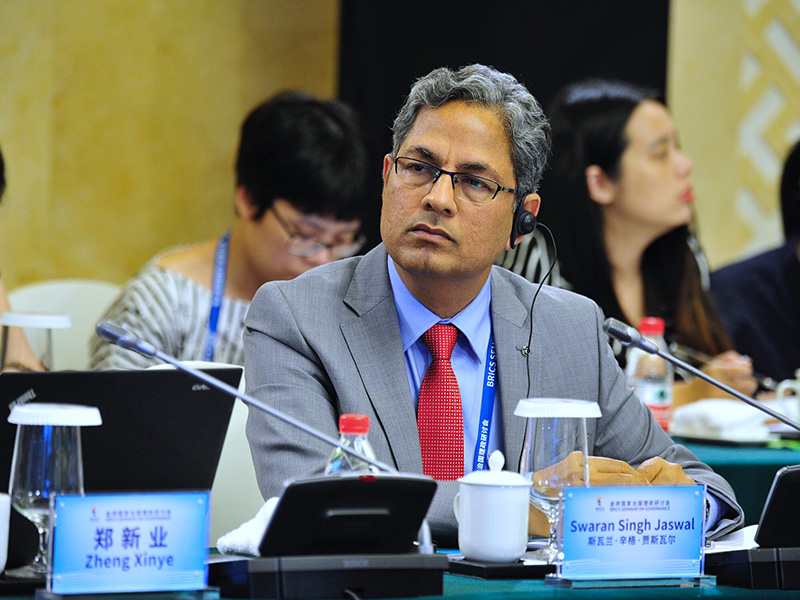[BRICS-Xiamen] Expectation for BRICS and the Xiamen Summit

Expectation for the Summit
The Xiamen Summit looks like it will be successful considering that all BRICS summits so far have been full of cohesion and consensuses. No problems between BRICS countries have disturbed any consensus building. The highest levels of the Indian government have repeatedly expressed hope that China’s hosting of BRICS would be successful.
During the summit, we may see several important announcements and declarations concerning BRICS. India is particularly looking forward to some clear announcements or action plans to address problems like terrorism, which plagues all these countries. China is also keen to tackle cyber security issues. Initiatives in other specific areas such as women empowerment, human trafficking, and climate change will certainly be launched. China leads in the world in implementing climate change measures, as demonstrated in their commitments in Paris. India has also made important promises. As a result, several issues will see important declarations made in Xiamen.
Of course, China is extremely good at hosting such grand events, and China has considerable experience hosting successful meetings of all kinds as big as the Olympics. The Chinese will produce another great event, and the summit will be organized nicely. It will show that BRICS is really moving forward with strength. The summit will ignite a wave of multilateral efforts from these countries.
Transformation of BRICS
BRICS has changed drastically from the original concept of BRIC incepted by Jim O’Neill. The group was first conceived because the four countries started growing so rapidly that it became clear they would overtake the total economy of G7 industrialized countries. Within two years, another study named Dreaming with BRICs:The Path to 2050, argued that the initial forecasts for the group were too ambitious and that more time would be needed for them to make such an impact. Another predicted that BRIC won’t overtake G7 until 2040. But these writeups were looking at four unrelated countries without imagining that BRIC would become a united force.
BRIC foreign ministers first met on the sidelines of UN General Assembly in 2006. In 2009, Russia hosted the first official summit. The transformation from a concept to an actual group was quick. The nation of South Africa, which had never been considered by O’Neill, was eventually added to bring the total to five countries and changed the acronym to “BRICS.” Soon, the five countries collectively began serving as the driver of global financial governance transformation. From 2009 to 2017, BRICS have expanded its agenda greatly and is now considered the torchbearer for climate change. The Xiamen Summit will feature specialized discussions among top leaders on topics such as human trafficking and woman empowerment. The agenda has expanded beyond what anyone could have imagined. In the future—at least the near future—the time will be ripe for BRICS to consolidate instead of expanding, either in terms of agenda or members, although many countries and organizations are eager to join the grouping. And the agenda needs to be consolidated rather than expanded for the time being. In the near future, BRICS focus should be put on further consolidation of its members. Many mechanisms hold regular meetings but lack a secretariat. Speeches from leaders often focus too much on their own national achievements.
The future demands a shift from individual focus to the focus of the grouping. It will happen as the group shifts from state-to-state relations to people-to-people relations and from inter-state to inter-association connections. Realms such as film, sports, education, information and personnel exchange will emerge as key drivers in creating a BRICS culture. A shift from cooperation in culture to joint work on BRICS culture is the direction BRICS should look in the future. Otherwise, the member will remain disjointed. The sizes of the economies vary, they’re physically far apart, political systems are different, growth rates don’t match and the languages are totally unrelated. How can such a grouping with members so drastically different from each other move closer together? Future focus must be on connecting people and creating BRICS culture. At BRICS forums, the focus should be completely on BRICS, which will happen after BRICS culture evolves.
BRICS has evolved and transformed so rapidly that it’s hard to keep up with the changes. Just a few years ago, the group was just an idea in the head of a Wall Street banker. If the organization continues transforming and evolving so rapidly, it will be difficult to steer. The original focus was to improve and transform global financial governance, towards which the group has taken two important initiatives: New Development Bank and the currency pool. These are solid initiatives. But if BRICS expands to every area, its initiatives will lose power and effectiveness. The attention and energy of the participants cannot be spread to too many areas. Therefore, BRICS needs to consolidate, focus on specific areas, take initiatives that can produce results and effectively implement programs as they did with the New Development Bank.
New Development Bank: Example of Success
BRICS New Development Bank is a successful example of BRICS work. BRICS founded a bank to finance development projects and create a new model of governance. This governance model is influencing financial institutions created in the wake of the Second World War—the Bretton Woods institutions. It should be noted that some voting rights in those institutions have already changed. BRICS stands for democratizing international relations, democratizing global financial governance and especially giving developing countries a voice in decision making. BRICS New Development Bank is a model of this new kind of governance. It is helping as a new model, but also by influencing transformation in old models. The bank is active, employs more than 400 and is already financing projects. We are lucky that the founding president of the New Development Bank hailed from India. This is the concrete example of BRICS success.
Swaran Singh Jaswal is a professor from School of International Studies of Jawaharlal Nehru University.